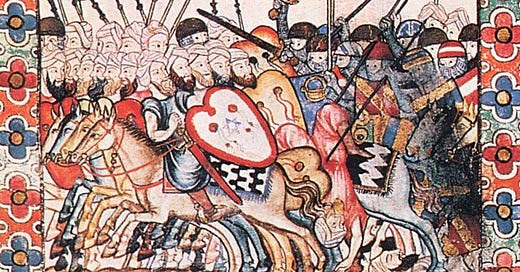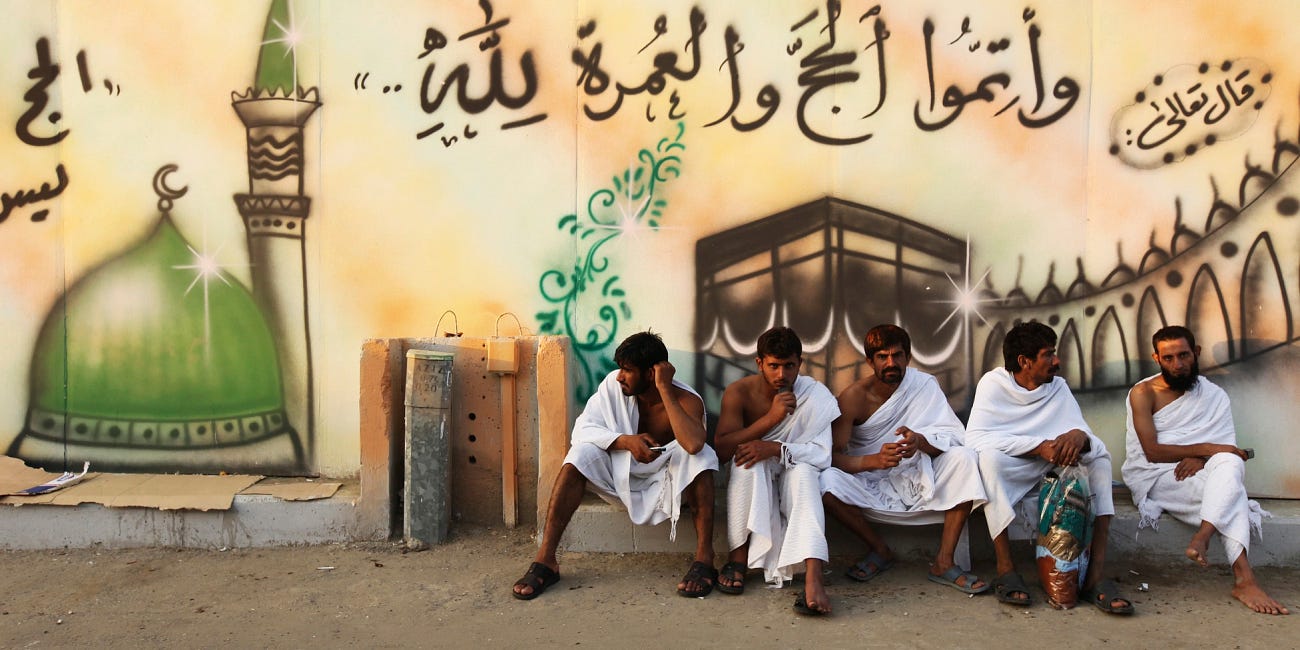Clashing civilizations in parallel
Review of God's Crucible: Islam and the Making of Europe, 570-1215 by David Levering Lewis
This delightful book evokes and partially analyses the explosive expansion of Arabic (then Arabo-Berber) Islam in the wake of the collapse of the Roman and Sassanid Empires to its eventual decline as a new Europe emerges. It portrays a dynamic civilization at its apogee, beginning in Syria and continuing in Spain; developments in a backward and stagnant Europe are covered in parallel, where its many peoples are struggling to define themselves as it emerged from a series of mortal threats.
The book begins not in 570 with the teachings of Mohammed, but during the Roman Republic, when Crassus' forces are annihilated by the Parthians, the most significant defeat that the Romans experienced in the east up to that time. In the author's view, this defeat set in motion a deadly conflict that would last the next 650 years or so, until the Byzantines and Sassanids were so exhausted that the Moslem jihadists were able to defeat or disable both empires. In the meantime, he also describes the implosion of the Western Roman Empire under the semi-barbaric Visigoths and later from pagan Saxons and Vikings. While I knew this history, there is a wonderful clarity and succinctness to this treatment, and it is evoked brilliantly.
As I see it, the narrative gains great momentum at the core of the book, when the princely Umayyad refugee (Abd al-Rahman) establishes himself in Spain and at the same time the Franks are forging a pact with the beleaguered popes, i.e. uniting might with faith under Pippin and then Charlemagne. The result is two very separate configurations of power, one from an ascendent new civilization and the other a crude copy of a vanished Roman Empire.
Following his suppression of the internal Berber rebelliousness, Islamic Spain under al-Rahman became a gloriously tolerant and eclectic society, though relatively speaking of course, given the strict limits and hierarchies in accordance with faith, ethnicity, and class. In their strictly circumscribed roles, Jews, Christians, and Moslems thrived together in commerce, public works, security, and in pursuit of intellectual activities. Perhaps Lewis over-idolizes the al-Rahman regime, which survived him for more than 300 years in various forms, but I think he gets it right. Though it never equaled the splendor of the rival Abbasid court in Bagdad, as enlightened despotism it was a far more fecund atmosphere for philosophy and science. If you’ve ever been to the Cathedral in Cordoba, you’ve seen the seamless melding of Islamic and Gothic architecture.
Nascent Europe, under the Carolingians, was a less civilized place, even if at the end of the dark ages. This does not reflect bias on the part of the author as some reviewers charge, but is indisputable fact. Roman traditions of literacy and administration had virtually disappeared, preserved in only a few monasteries. A proliferation of kingdoms and dukedoms guaranteed the spread of squabbling petty despotisms, which periodically undermined the martial labors of great consolidators like Charlemagne, sometimes in the next generation. While Charlemagne played a vital role in preserving Latin texts, cultural life as enjoyed by the elite had devolved to hunting and games of honor, replacing the Roman traditions of philosophical conversation, literature and art. It was also a crude barter economy, without currency to stimulate commerce and investment, in effect dooming most trade to local produce. Finally, Europe was under attack from all sides and appeared destined to shrink out of existence, as might all of Christendom.
The last third of the book is about the decline of Islamic Spain, first as the Umayyad dynasty degenerated and later as fundamentalist forces gradually eliminated freedoms and diversity, fracturing into weak city states, most of which were rubbed out by 1000 CE. At the same time, Europe was beginning to emerge as a military and technological force with the proto-industrial revolution of the Gothic era. Though increasingly intolerant of difference, particularly in the religious sphere, it was the start of the long ascent of the Christian world, which would expand during the next 1000 years. It is a truly remarkable transformation, a flipabout of the momentums of competing civilizations that occurred with astonishing rapidity.
Lewis offers a narrative of this evolution that is wonderfully dense and vivid. Arabic terms are peppered throughout the text, adding a unique sense of poetry to events. His prose is sometimes awkward, but overall it is polished and elegant, written at about the high undergraduate level. I enjoyed every single page of this and wanted to learn more about each development, a sure sign of success in my opinion.
However, it is sometimes difficult to follow the thread of the narrative, as if the writer is not quite certain of what he is looking to do. In the end, the story is there, but the book is not really about what the subtitle promises, that is, how Islam contributed to the making of Europe, except perhaps as mobilizing it militarily and transmitting a corpus of fundamental philosophical ideas. It is also not an academic historical work, but more a popularization, hence not for specialists. (As such, it was perfect for me.)
Related reviews:
How God has shown the way, particularly when the needs of our society change
Robert Wright likes to take on the big questions. In this book, he looks at God, or rather, how God has evolved in the minds (and political institutions) of men. There are a few basic ideas he wants to get across. First, he explores how the conception of God – as wrathful and intolerant or as promoting universal brotherhood, etc. – evolved in response t…
Emergence of Arab Islam and the end of Antiquity – in context
This book covers a seminal historical nexus, marking the death of classical civilization and the beginning of the medieval period. At the center of it is the rise of Islam, which would become the dominant cultural and military force for the next 800 years.
A hopeful introduction to Islam, advocating a "reformation"
If you are looking for a primer on the basics of Islam, this book is a good place to start. While conscious of the many problems that modernizing Islam would entail, Aslan makes the case for a reform movement. Perhaps this is naive, but there's no denying that it is needed and indeed not impossible.
Selim the Grim, his times, and the Ottoman version of Islam
This is a very fun biography on the brief reign of a political genius whose cultural impact was wide and deep, with resonances even today in Erdogan’s Turkey and Islamophobia. It is a quick read, with both an interesting narrative and an analysis that fleshes out how the people of his time saw the world. Even as a history enthusiast well acquainted with…







